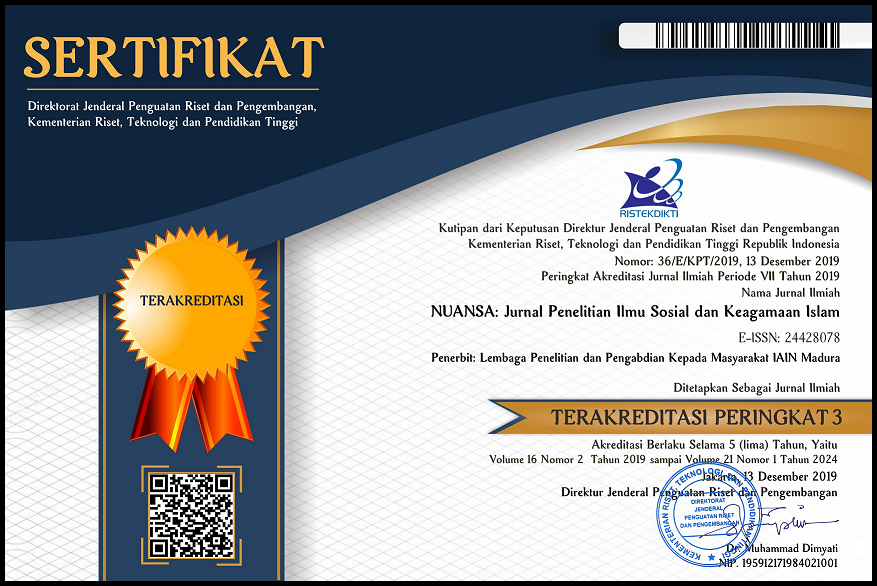Modal Sosial Perawat Perempuan Pada Masa Pandemi Covid-19 di RSUD Kota Bogor
 Abstract views: 316
,
Abstract views: 316
,
 pdf downloads: 279
pdf downloads: 279
Abstract
The purpose of this article is to explain the social capital gained by female nurses working in hospitals during the Covid-19 pandemic. The spread of the Covid-19 virus has had a severe impact in the city of Bogor with a population density that is mostly mobilised in Jakarta, thus triggering an increase in the spread of the Covid-19 virus. The recent Covid-19 pandemic strengthens the evidence that cities are vulnerable to disease. Even the Covid-19 pandemic has become a big problem in itself for nurses, where they face a lot of pressure, anxiety, depression, and stress. Nurses need social capital as a form of interpersonal relationships among colleagues and superiors that can reduce workload during the Covid-19 pandemic. The methodology used in this study is a qualitative approach with a case study research type. Data sources were obtained through observations and interviews using purposive sampling with specialised snowball sampling through semi-structured interviews with four informants. Some of the characteristics of the informants involved in the study include: female aged approximately 35 years, nurses with permanent employee status, married, and assigned to the special treatment room for Covid-19 virus patients. The findings of this study show that social capital owned by female nurses has three components, namely bonding, bridging, and linking. In addition, the role of social support from colleagues and superiors is also important for female nurses.
Downloads
References
Fatimah Fauzi Basalamah, Reza Aril Ahri, dan Arman Arman. “Pengaruh Kelelahan Kerja, Stress Kerja, Motivasi Kerja dan Beban Kerja terhadap Kinerja Perawat di RSUD Kota Makassar.” An Idea Health Journal 1, no. 02 (Desember 2021): 67–80. https://doi.org/10.53690/ihj.v1i02.33.
Field, J.Social Capital Terjemahan Nurhadi Modal Sosial. Bantul : Kreasi Wacana. (2010).
Goh, Yong-Shian, Qing Yun Jenna Ow Yong, Terri Hui-Min Chen, Su Hui Cyrus Ho, Yin Ing Cornelia Chee, dan Tji Tjian Chee. “The Impact of COVID-19 on nurses working in a University Health System in Singapore: A qualitative descriptive study.” International Journal of Mental Health Nursing 30, no. 3 (2021): 643–52. https://doi.org/10.1111/inm.12826.
Harsasto, Priyatno. "Membedah diskursus modal sosial dan gerakan sosial: Kasus penolakan pabrik semen di Desa Maitan, Kabupaten Pati." Politika: Jurnal Ilmu Politik 11.1 (2020): 18-30.
Hofmeyer, Anne T. “How can a social capital framework guide managers to develop positive nurse relationships and patient outcomes?” Journal of Nursing Management 21, no. 5 (2013): 782–89. https://doi.org/10.1111/jonm.12128.
Kasim, Fajri M., Abidin Nurdin, and M. Rizwan. "Agama, Modal Sosial dan Ketahanan Masyarakat dalam Menghadapi Bencana di Kota Banda Aceh." Jurnal Antropologi: Isu-Isu Sosial Budaya 23.1 (2021): 66-73.
Labrague, Leodoro J., dan Janet Alexis A. De los Santos. “COVID-19 anxiety among front-line nurses: Predictive role of organisational support, personal resilience and social support.” Journal of Nursing Management 28, no. 7 (2020): 1653–61. https://doi.org/10.1111/jonm.13121.
Magdalena, R. "Kedudukan perempuan dalam perjalanan sejarah (studi tentang kedudukan perempuan dalam masyarakat Islam)." Harakat an-Nisa: Jurnal Studi Gender dan Anak 2.1 (2017).
Mo, Yuanyuan, Lan Deng, Liyan Zhang, Qiuyan Lang, Chunyan Liao, Nannan Wang, Mingqin Qin, dan Huiqiao Huang. “Work stress among Chinese nurses to support Wuhan in fighting against COVID-19 epidemic.” Journal of Nursing Management 28, no. 5 (2020): 1002–9. https://doi.org/10.1111/jonm.13014
Poortinga, Wouter. “Community resilience and health: The role of bonding, bridging, and linking aspects of social capital.” Health & Place 18, no. 2 (2012): 286–95.
Prabowo, Fika Nurul Ulya dan Dani. 7 November 2022. UPDATE 7 November 2022: Bertambah 3.828, Kasus Covid-19 di Indonesia Capai 6.525.120. Jakarta : Kompas.com. https://nasional.kompas.com/read/2022/11/07/21501751/update-7-november-2022-bertambah-3828-kasus-covid-19-di-indonesia-capai
Rizky, Wahyu, Nurharyanti Darmaningtyas, and Brune Indah Yulitasari. "Hubungan jumlah tenaga perawat dengan beban kerja perawat pelaksana di ruang rawat inap kelas III RSUD Wates." Indonesian Journal of Hospital Administration 1.1 (2018): 38-42.
Rupita, Rupita. "Konflik Peran Perawat Perempuan pada RSUD Dr. Agoesdjam Kabupaten Ketapang Kalimantan Barat." NUANSA: Jurnal Penelitian Ilmu Sosial dan Keagamaan Islam 17.1 (2020): 32-45.
Shaukat, Natasha, Daniyal Mansoor Ali, dan Junaid Razzak. “Physical and mental health impacts of COVID-19 on healthcare workers: a scoping review.” International Journal of Emergency Medicine 13, no. 1 (20 Juli 2020): 40. https://doi.org/10.1186/s12245-020-00299-5.
Sheingold, Brenda Helen, dan Steven H. Sheingold. “Using a social capital framework to enhance measurement of the nursing work environment.” Journal of Nursing Management 21, no. 5 (2013): 790–801. https://doi.org/10.1111/jonm.12127
Shihab, M. Quraish. Wawasan Al-Qur'an Tafsir Maudu'i, atas Pelbagai Persoalan Umat. Bandung: Mizan. 1996.
Terri, Hinkley, Teresa-Lynn. “The combined effect of psychological and social capital in registered nurses experiencing second victimization: A structural equation model.” Journal of Nursing Scholarship 54, no. 2 (2022): 258–68. https://doi.org/10.1111/jnu.12715.
Varshney, Lav R., dan Richard Socher. “COVID-19 Growth Rate Decreases with Social Capital.” medRxiv, 2020. https://doi.org/10.1101/2020.04.23.20077321.
Wahyuningsih.“Pengaruh Input Produksi Wakaf Berupa Modal dan Tenaga Kerja Terhadap Produktivitas Aset Wakaf Pada Lembaga Wakaf Produktif Yayasan Badan Wakaf Sultan Agung Semarang.” Universitas Airlangga.(2016).
Young-Jae Kim, So-Young Lee and Jeong-Hyung Cho. 2020. “A Study on the Job Retention Intention of NursesBased on Social Support in the COVID-19 Situation.” sustainability 2-9. https://doi.org/10.3390/su12187276
Zeng, Zhen. “The myth of the glass ceiling: Evidence from a stock-flow analysis of authority attainment.” Social Science Research 40, no. 1 (2011): 312–25.
Copyright (c) 2023 NUANSA: Jurnal Penelitian Ilmu Sosial dan Keagamaan Islam

This work is licensed under a Creative Commons Attribution-NonCommercial 4.0 International License.
The journal operates an Open Access policy under a Creative Commons Attribution-NonCommercial 4.0 International License (CC-BY-NC) 
Authors who publish with this journal agree to the following terms:
- Authors retain copyright and grant the journal right of first publication with the work simultaneously licensed under a Creative Commons Attribution License that allows others to share the work with an acknowledgement of the work's authorship and initial publication in this journal.
- Authors are able to enter into separate, additional contractual arrangements for the non-exclusive distribution of the journal's published version of the work (e.g., post it to an institutional repository or publish it in a book), with an acknowledgement of its initial publication in this journal.
- Authors are permitted and encouraged to post their work online (e.g., in institutional repositories or on their website) prior to and during the submission process, as it can lead to productive exchanges, as well as earlier and greater citation of published work.





















